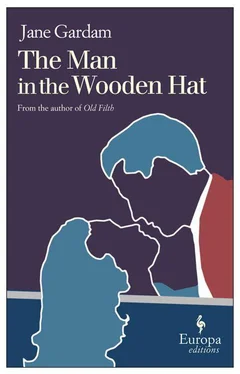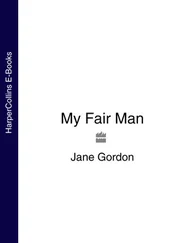At last she lost patience, phoned Nick to come home from work, left all the children except the baby with Mrs. Baxter, and turned up outside the conference room of the hotel where the Arbitration was being held and marched in.
The room was empty.
She sat down for a minute in the cigarette smoke. There were ashtrays and a few scattered pens, and a disquiet in the air. Then she flung off again to the hotel’s reception desk.
“They have adjourned,” said the concierge. “The Counsel for the contractors has had to fly suddenly to London. Illness. A child.”
“Good heavens! Mr. Feathers? But I spoke to him today.”
“No, Mr. Feathers is for the architects. This is Mr. Veneering. Would you like to speak to Mr. Feathers’s instructing solicitor? He could tell you more. He is somewhere about.”
“No. Thank you. It’s rather confusing. This is all to do with Mrs. Feathers. It’s nothing to do with Mr. Ross.”
“Ah, but it is,” said Ross behind them, and she turned and saw that he was seated in the foyer, his legs stuck out before him showing the soles of his tiny feet, his great head a sort of centrepiece to the mound of orchids and potted palms arranged on the marble floor. His hat lay beside him.
Ross did not look up from his playing cards as she walked across to him, the baby on her hip, and, still without looking at her, he said, “Mrs. Feathers has gone off with Mr. Veneering. Mr. Feathers does not know. I know, but no one else knows. I shall see that the matter is resolved. Mr. Feathers will never know, and if you or Miss Isobel Ingoldby ever let him know, I will break you. Is that clear? I will break you both.”
If I come to speak to you within the first hour of the operation,” the surgeon had said, “That will be to bring bad news. I have to make this clear. You do understand?”
“Yes.”
It was hardly half an hour since they had brought her tea and told her that the operation had begun when she heard the swing doors slam-bang at the end of the corridor and feet running.
Of course the feet need not be his. Harry could not be the only patient in this silent little hospital. The feet were running. It could be anyone. But the feet stopped outside her door. And at the same moment she realised that the feet had been running . Nobody runs to break bad news. The feet had been running !
She stood up and a man opened the door clumsily, pushing it with his shoulder. He had a turban of dark green cloth round his head and a green apron tied about with tapes. He was holding up his hands and arms at right-angles from the elbow as if he were a priest at votive offering. Or maybe a janitor. There was a smell of disinfectant.
The eyes, however, were the surgeon’s eyes, very bright. He said, “Mrs. Veneering, all is well. All will be perfectly well,” and was gone.
All she could think was: Now he will have to take all that off and scrub up again before he can go back to do the chips of bone. And she sat down again and looked at the closed door.
She sat on and on until someone suggested she changed into night things and went to bed. “I shan’t sleep,” she said, but slept almost at once.
When she woke she was in familiar trouble, gathering her towel and sponge bag and clothes, finding a bathroom. Returning, two solid young nurses were looking down at her sheets with amazement. In shame — she could not say one word to them — she went along to the duty nurse outside, and the duty nurse smiled at her.
It was the toothy nurse. “I can see into theatre from my little room,” she said. “The lights were on all night. It must have been nine hours ! I thought, “Oh, that poor boy, he’s still in there. But he’s alive. They’ll get him back.”’
“It’s not, after all, cancer, nurse. Did you know?”
“Oh, we all know. Word went round. All round the hospital. We’ve all been thinking of you.”
“Thank you.”
“Mr. Veneering’s just arrived. They’re telling him the good news downstairs.”
“Then,” said Elisabeth, “I’ll go. I’m not Harry’s mother, nurse, but I know his father very well. They’ll both be all right now. They won’t need me.”
At the entrance to the hospital she asked the desk to get her a taxi and kindly ring the Westminster Hospital — she gave them the correct extension — to say that she was coming in this morning, at once.
Her hysterectomy, the nurses told her the next day, had been “very necessary.” ‘There were pre-cancerous cells,” said the surgeon. “They were in one ovary and the womb is gone too, but we have left you with the other ovary so that you won’t suffer a premature menopause.”
“Thank you.”
“We’re really delighted that you came to us so quickly. And just in time. You are young and strong, Mrs. Feathers. Is your husband about the hospital today?”
“He’s about his work on the other side of the world.”
“Brave girl. Brave girl.”
(Oh, shut up, she thought. Meet Amy.)
“And he will soon be coming back? You are going to need a lot of care. Have you any children who could help?”
“No. I am not yet thirty.”
“Oh, yes. Yes, of course. I’m sorry.”
“Not as sorry as I am.”
Yesterday when they returned her to the ward after the operation she had partly woken and found that she had changed sex and century. She was a man, a soldier being tipped into some sort of mass grave. She smelled the wet earth of France. When she woke much later there was sunlight all round her body, which was neatly arranged under a thick white sheet. Bouquets and clumps of flowers were all around her. I am on my catafalque. And I have woken up. How embarrassing for them. I will sit up very slowly in the middle of the service as they sing me out. Someone pushed her down against a pillow and, when she woke next, Filth was sitting by the bed, reading The Times . He glanced across, saw her open eyes and smiled, stretching to her hands and kissing her fingers and wrists.
“You came,” she said.
And he said, “Of course. I’m going back on Monday. Short adjournment.”
“You’ll kill yourself. Jet lag—” and dropped asleep.
When she next woke he was asleep in the chair and she watched his peaceful face.
“He is open as the day.”
“What?” he said. “What?”
“You are as open as the day.”
“Why should a day be open? I’ve often wondered. Some days are sealed off, thanks be. I don’t want to open up the day of your operation again.”
“I thought of you. Now and then.”
“Needless to say, the other side was to have been Veneering, but he bunked off back to London. Left his junior, a useless fellow, and I ran him into the earth in double quick time. I got here for breakfast. Saw two moons rise.”
“Shall you see two more rise, going back?”
“I didn’t come here to look at moons.” He rested his head against their clasped hands on the bed sheet.
She said, “I’m sorry, Edward. No children now,” and slept.
She woke again and he said, “D’you know, I never really wanted any children. Only you.”
When she woke next he had gone, and when she left the hospital two full weeks later it was with Isobel Ingoldby.
She had found Isobel standing at the foot of the bed, tall as a camel and eating a pear.
“Home,” she said. “I’m taking you.”
“Oh, Lizzie. Lizzie-Izz.”
“Wrap yourself up. It’s turning towards autumn. Get this on over your sweater.” It was a brown and gold pashmina, warm and light and smelling of spices.
The nurses were kind, full of congratulations about how well she had done. They settled her into a taxi and into the world again.
Читать дальше












